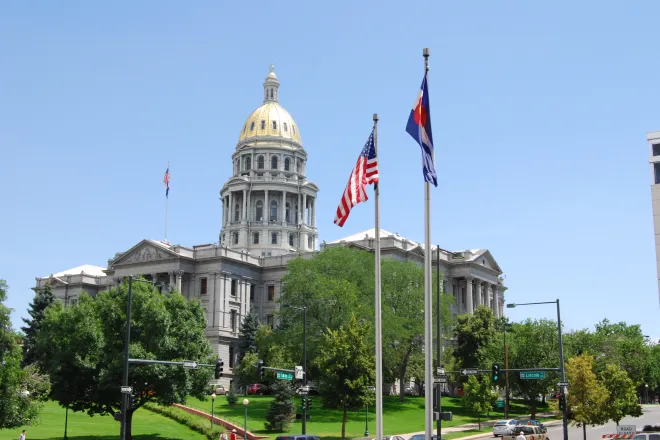
Daily Audio Newscast Afternoon Update - November 20, 2025
© INDU BACHKHETI - iStock-1336427297
News from around the nation.
Trump approves the release of the Epstein files, but loopholes remain; CT advocates continuing push to bolster offshore wind; Cincinnati's climate blueprint shows progress as Ohio cities look on; National Rural Health Day: Rural NC at risk from federal service cuts.
Transcript
The Public News Service Thursday afternoon update.
I'm Mike Clifford.
Relenting to pressure from his base, President Trump Wednesday announced on social media that he signed legislation calling on the Justice Department to release its files on the convicted sex offender Jeffrey Epstein within 30 days.
That for the New York Times.
The report Trump's signature does not guarantee the release of all files.
The bill contains significant exceptions, including a provision protecting continuing investigations.
Which could mean many documents would stay confidential.
Meantime, Connecticut environmentalists are eager to see more progress made on offshore wind.
This comes after President Trump attempted to pause all offshore wind projects, including Revolution Wind, which was 80 percent complete at the time.
It's expected to generate enough energy to power 350,000 homes across not only Connecticut, but the New England region.
Juliana LaRue with the Sierra Club Connecticut chapter says the state's gas industry has created numerous environmental and health harms.
The Department of Energy and Environmental Protection reported emissions from power plants increased in twenty twenty three, and with nine gigawatts of offshore wind, the New England States could cut 42 percent of annual carbon dioxide emissions from the power sector.
But offshore wind faces barriers in getting up and running.
Delays in the federal permitting process have held up some clean energy projects for more than a decade, excluding the time it takes for lawsuits against these projects to get.
Get through the courts.
I'm Edwin J. Viera.
Next to Cincinnati, where leaders say the city's ambitious Green Cincinnati plan is moving forward, despite financial uncertainty and shifting federal priorities.
The 2023 Green Cincinnati Plan lays out 30 goals and more than 100 priority actions aimed at cutting emissions, improving resilience, expanding clean energy and strengthening partnerships across the city.
Cincinnati is now halfway through its five-year implementation cycle, and city officials say early progress shows what's possible when residents, nonprofits, businesses, and government collaborate.
Molly Robertshaw is Sustainability Manager for Cincinnati's Office of Environment and Sustainability.
She says the momentum continues even in challenging times.
We are halfway through our Green Cincinnati plan implementation.
This gave us a great chance to showcase the many different projects that are moving forward amidst challenging times here in Cincinnati.
Next, today is National Rural Health Day.
Head of the North Carolina Rural Center, Patrick Woody, says one concern right now is the impact from cuts to social services under the One Big Beautiful Bill Act, which will.
Reduce federal funding on Medicaid by more than $900 million over the next decade.
We're really worried about a lot of our rural folks losing care.
We're very concerned about how cuts or changes in Medicaid, Medicare.
Really, any of it, how it flows down, and what that will mean to our rural citizens.
North Carolina has the second largest rural population in the country after Texas, with more than 3. 4 million rural residents, according to the 2020 census.
This is Public News Service.
Transgender people lost to acts of violence are being honored today, even as more anti-trans legislation is introduced in the U.S. and violence against them has increased.
November 20th is Transgender Day of Remembrance, set aside to raise visibility of transgender people and acknowledge the community's contributions to society.
Mateo Nevilles with The Lavender Rights Project says the current political climate is contributing to the dehumanization of trans people.
National narratives are designed to erase us.
We're not your political scapegoat.
We're not something that people should use to score points.
We're human beings and we deserve for our humanity to be honored.
The first day of remembrance was held in 1999 and is now observed across the U.S. and in many other countries.
I'm Roz Brown.
And rural health care advocates are using Rural Health Care Day Today to highlight challenges facing rural hospitals. and medical centers in Virginia.
Researchers at Virginia Commonwealth University found more than forty percent of neighborhoods in the state lack adequate access to primary care physicians, primarily in rural areas.
Beth O'Connor with the Virginia Rural Health Association says issues like the costs of attending medical school mean future doctors often look for higher paying jobs in urban areas, making it more challenging to bring people from urban areas to rural ones.
Sometimes you can get a kid from an urban area to go to a rural area, but it's much easier to get a student from Grundy.
To go back to Grundy than it is to try to recruit a kid from Alexandria to go to Grundy.
O'Connor adds concerns about broadband access and commute times can push people toward urban medical settings rather than rural ones.
I'm Zimone Perez.
Finally, a new order from the Oregon Governor, Tina Kotek, directs state agencies to put more energy towards making the state's ecosystems more resilient to climate change.
The order sets a decade-long goal to protect and restore an additional 10 percent of the state's lands and waters.
Nils Christofferson is with Wallawa Resources, a nonprofit based in Northeast Oregon.
He praised the governor's order for its strong vision, especially.
The idea that healthy ecosystems and healthy local economies go hand in hand.
If we can focus our programs, policies, and investments to support the families and individuals who steward these lands.
With clear guidance about the targets, I think that's where we'll see tremendous benefit for rural Oregon.
The order directs state agencies to identify Science-backed strategies to respond to intensifying droughts, wildfires, heat, and sea level rise brought about by climate change.
A 2021 proposal from the Oregon Climate Action Commission found that natural and working lands reduced U.S. emissions by 12 percent.
Percent in 2019, and that protecting and restoring them could double this reduction.
I'm Isabel Charlay.
This is by Clifford for Public News Service.
We are member and listener supported.
Find our trust indicators at publicnewsservice.org.














